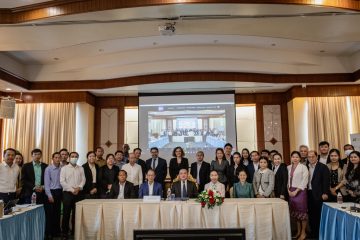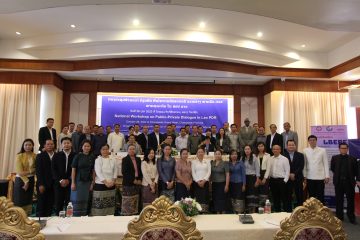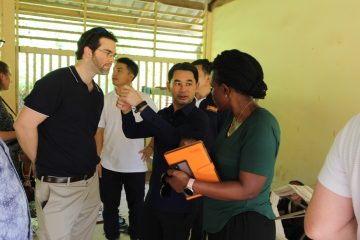Lao Public and Private Sectors together with Development Partners discuss the impact of ongoing mega infrastructure projects on private sector development in the country
Vientiane, 29 October 2019. The annual Trade and Private Sector Working Group meeting – main policy dialogue platform between the government and development partners took place at Landmark Hotel, Vientiane Capital.
The meeting discussed opportunities and challenges emerging from ongoing and planned mega infrastructure projects, especially the Lao-China Railway project for private sector development in Laos. The meeting also reviewed progress on addressing specific issues concerning Government’s business environment reform program.
The meeting was chaired by H.E. Mrs. Khemmani Pholsena, MOIC Minister, and co-chaired by H.E. Mr. Leo Faber, European Union’s Ambassador and H.E Mr. Jean-Bernard Carrasco, Australian Ambassador to Lao PDR. The meeting attracted more than 100 participants from line ministries, development partners, and domestic and foreign private sectors.
In her opening remarks, Minister emphasized that while there is a broad agreement that no country has sustained rapid growth without also keeping up impressive rates of public investment – in infrastructure, education, and health, we should focus our discussions on “how we can maximize public spending on infrastructure to crowd in private investment and expand investment opportunities and raise the return to private investment, as well as pave the way for new industries to emerge, which is also a crucial aid to structural transformation and export diversification.”
In his opening remarks, H.E. Ambassador Leo Faber, the co-chair of the meeting, stressed that we consider that Laos and its wealth in natural resources can have a positive impact on climate change and speed up a global transition to low-carbon economies, by inter alia developing eco-tourism, high-end agricultural products and a sustainable forest management, including a wood industry.
The co-chair also added that we all agree that a business enabling environment, based on transparency and predictability are instrumental to attract quality investments to the country. “In the absence of a comprehensive set of rules, the improvement of the business and investment climate will remain a challenge. The publication of secondary legislations and a well-functioning inter-agency cooperation are also equally important for the genuine enforcement of the relevant laws”, stressed by the H.E Ambassador Faber.
The haft day meeting had a very productive discussion on necessary policy-based reform measures to ensure maximum impact of increasing investment in transport infrastructure on national economic diversification policy. The meeting also exchanged views on implementation progress of key business enabling environment reform initiatives and reached broad consensus on practical next steps to accelerate reform process in the country.
The co-chair from Australian made a closing remarks by reiterated the H.E Minister Pholsena on the key message addressed at the opening on the how we can better prioritize the reform priorities in particularly the trade facilitation and private sector development. Also, communicating results of the reforms to public and key stakeholders especially the private sector is most important. “As development partner, we continue to support the trade and private sector development agenda to reap the benefits of the multilateral development agencies.” H.E Jean-Bernard Carrasco, Ambassador of Australia to Lao PDR emphasized in his closing remarks.
In her closing remarks, H.E. Mrs. Khemmani Pholsena stressed the importance of pursuing complimentary logistics and trade facilitation reforms, including simplification of border procedures and developing an effective transit regime along with making large investment in transport infrastructure (the railway) to ensure full economic benefits. Minister closed the meeting by thanking all concerned parties from government, private sector, and development partners for their support and active participation in the policy dialogue under the Trade and Private Sector working group.
The TPSWG is one of ten sector working groups under the Round Table Process and is the main forum for policy dialogue between the government of Lao PDR and development partners. Participants of the forum usually come from government, development partners, the private sector and civil society. Other 9 sector working groups include Health; Education; Governance; Macroeconomics; Infrastructure; Illicit Drug Control; UXO; Agriculture and Rural Development; and Natural Resource and Environmental Management.


